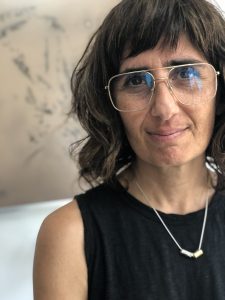Dina Georgis

Areas of Interest
- Postcolonial Studies
- Affect Studies
- Queer Theory
- Psychoanalysis
Presently working on a project provisionally titled, “Making Use of Objects: Play and Radical Witnessing of War.” This work explores what it means to ethically witness others not as knowable objects but as engaged subjects composing themselves and their surrounding worlds in acts of play as they make use of resources from everyday life. It views play as creative capacity made through pleasure/pain, curiosity and refusal. Focusing on war and conflict in the MENA region, this work demonstrates that the outcomes of play not only have personal implications but social and political ones as well.
I supervise student projects in the following areas: Aesthetic Expression; Trauma, War and Art; Arab Sexualities; Trans Studies; Middle East Literature and Culture; Psychoanalytically informed work.
Biography
My work is situated in the fields of postcolonial and sexuality studies. I draw on psychoanalysis to conceptualize how expressive and political cultures are responses to affective intensities. My book, The Better Story: Queer Affects from the Middle East (SUNY, 2013) considers the emotional dynamics of political conflict, the stories and subjectivities they produce, and what it means to make an ethical relationship to conflict. I’ve published essays on aesthetics, memory and the Lebanese civil war and on queer Arab ontologies. My work can be found in Psychoanalysis, Culture and Society, Studies in Gender and Sexuality and in International Journal of Middle East Studies.
Education
PhD, York University, 2003
MA, OISE, University of Toronto, 1995
B.A., York University, 1989
Selected Works
Monograph
Georgis, Dina. The Better Story: Queer Affects from the Middle East (SUNY, 2013)
Co-Edited Scholarly Works
Georgis, Dina, McKittrick, Katherine and Walcott, Rinaldo, eds. 2015. No Language is Neutral: Writing on Dionne Brand, TOPIA, Issue 34.
Georgis, Dina, Sara Matthews, James Penney, eds. 2015.The Freudian Legacy (Canadian Network of Psychoanalysis and Culture), Volume 1. https://cnpcrcpc.com/cnpc-1-the-freudian-legacy-today-2015/
Select Refereed Journal Articles
Georgis, Dina (2022) The Hush of Chaos: Pain and Play in Sara Fattahi’s films on the Syrian War, Free Associations Journal. 86 (September): 63-7. URL: http://www.freeassociations.org.uk/
Dina Georgis & Sara Matthews (2021) The trouble with research-creation: failure, play and the possibility of knowledge in aesthetic encounters, International Journal of Qualitative Studies in Education, DOI: 10.1080/09518398.2021.1888164
Georgis, Dina. 2020. “Play and the Queer Feeling of Hope in Hani Abu-Assad’s The Idol. Emotion, Space and Society. Vol 37. DOI: https://doi.org/10.1016/j.emospa.2020.100738
Georgis, Dina. 2019. Freud, Fanon and the Difference that Desire Makes. 2019. Ed Beyhan Farhadi and David Seitz. Emotion, Space and Society. Vol 31(May): 105-107.
Dyer, Hannah and Georgis, Dina. 2017. “Play Interrupted: Love Amidst Difficult Futures for the Children of Gaza.” Review of Education, Pedagogy, and Cultural Studies. DOI: 10.1080/10714413.2017.1372973
Georgis, Dina. 2016. “Akram Zaatari’s Queer Radical Hope: On Being a Curious Archivist/Artist” Free Associations Issue 68 (Spring): 1-25.
Georgis, Dina. 2014. “Discarded Histories, Queer Affects and the Adjectives of Pain in Anne Carson’s Autobiography of Red.” Studies in Gender and Sexuality Vol 15( 2): 154-166.
Georgis, Dina. 2013. “Thinking Past Pride: Queer Arab Shame in Bareed Mista3jil.” International Journal of Middle East Studies. 45 (2): 233-251.
Georgis, Dina. 2011. “What Does the Tree Remember? The Politics of Telling Stories.” TOPIA. 25: 222-229.
Georgis, Dina. 2006. “Cultures of Expulsion: Memory, Longing, and the Queer Space of Diaspora.” New Dawn: The Journal of Black Canadian Studies. 1(1): 4-27.
Teaching
Graduate Courses:
WGS 1023: The Aesthetics of Radical Hope
